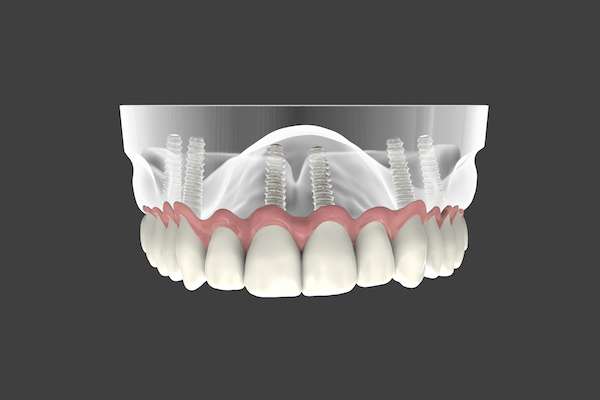 Unlike traditional dentures, implant supported dentures are, for the most part, permanent. The implants are permanently affixed to the jaw, although the patient can choose fixed or removable dentures. The method of placement is beneficial for many reasons, and the result is a more natural look and fit than regular dentures.
Unlike traditional dentures, implant supported dentures are, for the most part, permanent. The implants are permanently affixed to the jaw, although the patient can choose fixed or removable dentures. The method of placement is beneficial for many reasons, and the result is a more natural look and fit than regular dentures.
Benefits of implant supported dentures
The dentures are connected to dental implants, which are attached to the bone. This results in a number of benefits over traditional dentures:
- Preserves the jawbone and prevents facial structure deterioration.
- Eliminates the need for adhesives.
- Increases stability, which restores natural chewing ability.
- Provides a natural look.
- Allows for a better fit, which prevents mouth and gum sores.
- Enhances self-confidence.
Implant supported denture procedure
There are numerous considerations to think about when deciding how to replace missing teeth. For those who decide on implant supported dentures, the process requires several steps.
Consultation
Not everyone is a candidate for implant supported dentures. At the initial consultation the dental professional determines if a patient is qualified for the procedure and also goes over alternative options.
A good candidate is someone who is missing multiple teeth and has adequate jawbone density to support the implants. A person should also be diligent with good oral hygiene, not have underlying health conditions and be a nonsmoker.
Teeth extraction
This step is only for those who are using dentures to replace damaged or diseased teeth. These teeth are removed and, once the extraction site has healed, the implants are placed into the jaw.
Implant placement
Dental implants are small titanium screws that the dentist surgically inserts into the jawbone. Depending on if the dentures are going into the upper jaw or lower jaw or both, the number of implants placed typically range from 4 to 13. After placement, there is a healing process that allows the bone and gums to grow around the implants. This can take anywhere from three to six months.
Denture fabrication
Once the gums have healed, the dentist takes an impression of the teeth and makes a wax model to ensure the final dentures fit well. The mold is sent to a lab where the dentures are made from natural-looking materials.
Hardware attachment
After gum healing, hardware, known as an abutment, bar or snap, is attached to the implants. During the process, the gum tissue is reopened to expose the implant and then the hardware is attached. This area then needs to heal, which takes an average of two weeks.
Tooth restoration
The final step in the procedure is to place the custom-made dentures to the hardware. The dentist makes any final adjustments so the fit is secure and comfortable.
Check out what others are saying about our dental services on Yelp: Implant Supported Dentures in San Antonio, TX.
Conclusion
Implant supported dentures are one way to replace missing teeth and restore normal function. Patients should properly care for the dentures by brushing, flossing and visiting the dentist twice a year. Doing this reduces plaque buildup and enhances the life span of the dentures, which typically ranges from 10 to 20 years.
Request an appointment or call Evans Family Dentistry at 210-503-7043 for an appointment in our San Antonio office.
Related Posts
Restorative treatments encompass a broad range of dental procedures designed to help patients recover oral health and self-esteem via improved aesthetics. Patients who have suffered oral damage due to tooth decay, gum disease, or trauma might benefit from restorative therapy. Visiting the emergency dentistry office as soon as possible is advisable to restore oral health…
Dental implants can replace all or a few missing teeth. One of their most attractive benefits is that they can last a lifetime with proper care. However, the dental implant process can take longer than some people realize. Here is a breakdown of the process and what patients can expect.Before one can receive dental implants,…
Embarking on the journey to a straighter smile has never been easier, thanks to clear aligners. Clear aligners offer a discreet and convenient alternative to traditional braces, making orthodontic treatment more accessible for adults and teens. Understanding the clear aligners process from start to finish can help patients feel more confident and prepared for their…
